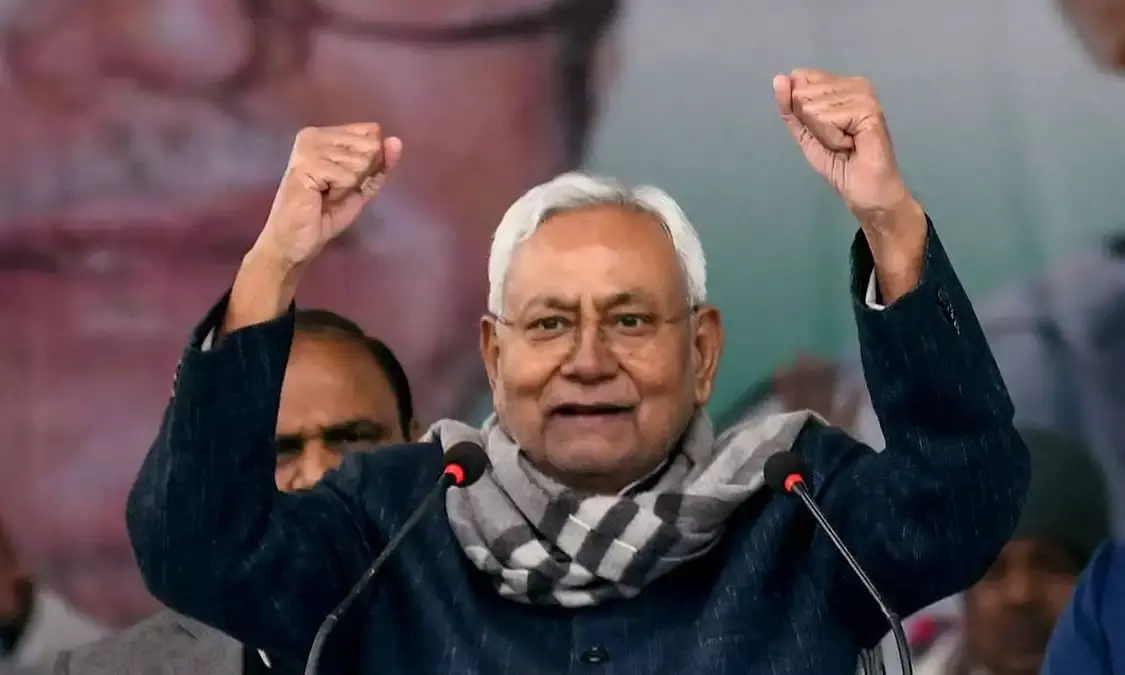Eight Years of Liquor Prohibition in Bihar: Triumph or Trouble?
Nitish Kumar’s Landmark Policy Spurs Social Change but Faces Criticism Over Enforcement and Economic Impact;

Eight years have passed since Bihar Chief Minister Nitish Kumar implemented the landmark liquor prohibition law on April 5, 2016. This bold move, rooted in Kumar's vision of creating a drug-free society and addressing social evils, remains one of the most polarizing policies in the state's history. While the government highlights its transformative impact on society, the opposition paints a grim picture of its failures.
A Social Revolution or a Policy in Peril?
The liquor ban was introduced as a cornerstone of Nitish Kumar's broader social reform agenda. With a focus on reducing domestic violence, ensuring women's safety, and fostering societal harmony, the policy was seen as a step toward building a "better Bihar." According to official data, the prohibition has led to a 45% reduction in crimes against women, a remarkable contrast to the 3% national increase in the same period.
Moreover, the government claims that nearly 1.82 crore people have given up alcohol since the ban. A 2023 survey showed overwhelming support for the policy, with 99% of women and 92-93% of men endorsing it. Women, in particular, have credited the ban with significant improvements in their standard of living and freedom from domestic violence and exploitation.
Tourism, often an indicator of societal stability, has reportedly increased in Bihar post-prohibition. The government has also introduced rehabilitation and employment schemes, such as the Jeevikaarjan Yojana, to support those affected by the ban, including former workers in the liquor industry.
The Opposition’s Criticism
However, the opposition argues that the ban has failed to deliver on its promises. They point to the rise in illicit liquor sales and home delivery networks, which have given rise to a thriving black market. The state has also witnessed numerous deaths due to the consumption of spurious or poisonous liquor, raising serious questions about the effectiveness of enforcement.
"Prohibition has become a façade. On paper, the government may boast about its success, but the reality is different. People are dying, and the law is being violated every day," said a senior opposition leader.
Critics also argue that the ban has deprived the state of significant revenue that could have been used for development projects. Bihar remains one of the poorest states in India, and many believe the economic impact of the prohibition has been overlooked.
A Historical Movement with Challenges
Nitish Kumar's commitment to the prohibition law is evident. The world's largest human chain, formed on January 21, 2017, in support of prohibition and de-addiction, involved over 3 crore participants and spanned an impressive 11,000 kilometers. The Chief Minister has also personally spearheaded awareness campaigns, addressing the grassroots about the adverse effects of alcohol consumption.
In 2022, the government introduced an amended prohibition law to tighten enforcement and address loopholes. Yet, challenges persist. The strict implementation of the law has often led to allegations of administrative high-handedness and selective enforcement.
A Policy that Defines Nitish Kumar’s Legacy
For Nitish Kumar, the liquor ban is more than just a policy; it represents his vision of a reformed and harmonious society. The Chief Minister has often cited Mahatma Gandhi and Jananayak Karpuri Thakur as inspirations behind his efforts. "Prohibition was not just a demand from women; it was a moral obligation to ensure a better future for the families of Bihar," Kumar said during the law’s implementation.
Eight years later, the liquor ban in Bihar remains a double-edged sword. While it has undeniably brought about social reforms and improved women’s lives, the shadow of illegal activities and tragedies from spurious liquor consumption looms large. As Bihar continues to grapple with the complex realities of prohibition, one thing is certain: the debate over its success or failure will continue to shape the political and social discourse in the state.
Conclusion
The prohibition law has undoubtedly redefined Bihar's social and political landscape. Whether it stands as a triumph of reform or a policy fraught with challenges, the liquor ban remains a defining chapter in Nitish Kumar's governance. As the state moves forward, addressing the gaps in enforcement and combating the illicit liquor trade will be crucial to ensuring that the vision behind prohibition is truly realized.

